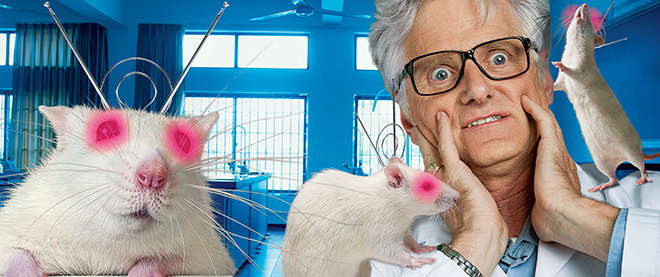Killer robots on the loose (again)
Supercomputers built with networked animal brains: What could possibly go wrong?
Photo Illustration by Sarah MacKinnon
Share

It’s summertime—the weather is lovely, the beer is cold and the killer robots are coming to murder us all. Downside: Eradication of all humankind. Upside: No need to fuss with sunscreen. I call that a draw.
I know what you’re thinking. You’re thinking, “You’ve been warning us about the blood-soaked dawn of the robot uprising for years now! When, at long last, can we finally expect to be eviscerated by our toasters?” People, we can’t rush the robocalypse, although some scientists are definitely trying.
The latest news is that Japan just launched a talking robot into orbit to serve on the International Space Station. The robot is known as Kirobo—which is apparently derived from the Japanese words for “hope” and “robot.” In fitting symmetry, the screams of its astro-victims will be derived from the Japanese words for “Ow!” and “Why are you doing that to my pancreas?”
Don’t get me wrong: Progress is great. We owe a debt to the many scientists and engineers who have worked so hard and sacrificed so much to ensure that modern refrigerators have WiFi. In our bold and bright tomorrow, no bottle of ketchup will be denied the opportunity to receive texted photographs of Anthony Weiner’s underpants.
But sometimes it seems as though we’re inviting annihilation. Take the work of Boston Dynamics, a leading developer of robots for military use. One version of its Big Dog line of robots is essentially a pack mule meant to carry 400 lb. of supplies for soldiers—or, depending on how things go, to trap soldiers under 400 lb. of supplies.
The newest Big Dogs are even more impressive. One model can outrun Usain Bolt (I think the company used that fact simply as a comparison—but if the sprinter turns up face-down with a robo-paw print in his back, we’ve got our suspect). Another comes with a mouth capable of picking up and casually tossing aside a cinder block. A 600-lb. lightning-fast mechanical cheetah equipped with super-strong jaws of death? I ask you: What could go wrong?
In other news, scientists recently linked the brains of two rats on different continents in an experiment that could pave the way for organic supercomputers built from networked animal brains. This achievement raises a number of questions, such as: a) Why would anyone do that?? and b) THAT QUESTION AGAIN, BUT LOUDER.
“Don’t worry—it’s not telepathy, it’s not the Borg,” neuroscientist Miguel Nicolelis said reassuringly, probably as a brain-linked rat slowly rose behind him clutching piano wire.
Surely there are potential advances that could come from linking a bunch of central nervous systems. Maybe one day, with thousands of brains networked together, we’ll be able to cure paralysis or possibly even write a Matthew Perry sitcom that isn’t terrible.
But we’ve all seen enough movies to know that when a scientist says a breakthrough isn’t something, there is roughly a 107 per cent chance that it is, in fact, that very thing. So when Dr. Nicolelis says this isn’t the beginning of a cybernetic master race that will sweep through the galaxy, assimilating billions of innocents into its hive mind, what he actually means is: Resistance is futile.
But let’s not get too emotional about our species’ wholesale, and probably very gross, demise. We’ve had a good run. We mastered the nuance of language. We travelled bravely toward the stars. We invented Febreze.
In recent months, more academics have expressed concern about a potential robocalypse. In fact, two scientists theorized that a self-aware Internet might already exist. (If true, let’s hope it’s seeing someone about that porn addiction.) By some estimates, new progress in artificial intelligence has made even rudimentary robots smarter than 90 per cent of our reality-show participants and 75 per cent of our Baldwin brothers.
Alas, I’ve saved the most distressing news for last. It was recently reported that U.S. defence contractors are working on robots that can fuel themselves by consuming “organic matter” found on the battlefield. Some took this to mean the machines would potentially ingest the bodies of dead soldiers. But no, the companies insist their creations will eat only plant matter.
So wait—we’re forcing robots to be vegetarians? Do we really need to give them another reason to hate humans?
Follow Scott Feschuk on Twitter @scottfeschuk